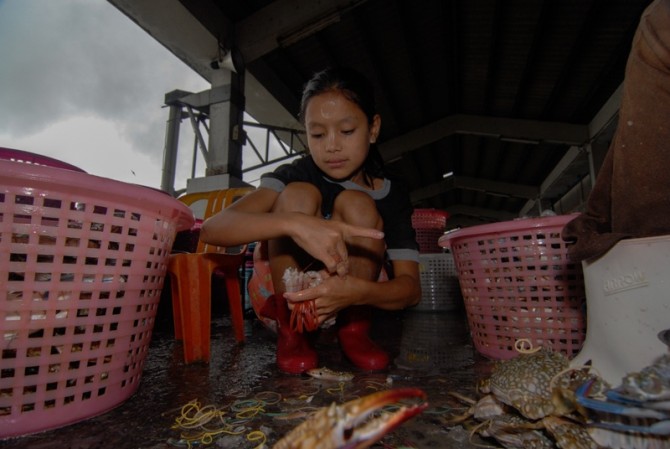Migrant rights groups are calling for Burma and Thailand to form an agreement that will ensure the process for Burmese migrants renewing documents is not strenuous, timely and expensive.
Ahead of a visit to Thailand by Burma’s State Counsellor and Foreign Affairs Minister Aung San Suu Kyi on 23- 25 June, rights groups have renewed a call for a long-term migration policy between the neigbouring countries.
“We are hoping that Aung San Suu Kyi’s trip will bring rule of law, transparency, cost effectiveness and predictability to the whole process of entering the country,” said migrant rights advocate Andy Hall.
In keeping with her pre-election promise that she would do her best to protect migrant workers and help them repatriate if they wish to return home, it has been reported that Suu Kyi will visit Mahachai, a port close to Bangkok and a major hub for the fishing industry that employs thousands of Burmese migrants. The visit to view Burmese workers’ conditions in Mahachai is believed to be one of the priorities on her trip.
[related]
Migrant rights groups say they hope she will talk with the Thai government about improving legal processes of protection for Burmese migrants.
“Sometimes they [authorities] issue temporary passports, extend visas for four or six years, give out pink cards, and now they are talking about issuing certificates of identity,” said Hall in a telephone interview with DVB on Wednesday, declaring “the system is absolutely chaotic, devoid of the rule of law.”
It’s estimated that about 1.6 million Burmese migrant workers are residing in Thailand.
Migrant Assistance Program Foundation director Brahm Press says a long-term policy is required. “We hope to see Burma continue to exert pressure on the Thai government, and simplify the migration policy so that employers and agencies have less control over migrants’ freedoms,” he told DVB.
He also suggested that recruitment agencies need to be monitored more closely with more regular site visits to locations where migrants are working.
Migrant rights groups say that exploitation by agents, confiscated passports and wage deductions are reported regularly to them by migrants. Both Hall and Press emphasised that complaint mechanisms need to be strengthened with enforcement.
Suu Kyi has previously stressed the importance of education for children of Burmese migrants. Hall said he is confident that Thai authorities will help coordinate access to education, as well as skilled training for workers.
However, questions linger over whether Thai authorities and businesses will want to invest in training migrants, rather than simply continuing to employ them as cheap labour.
“Suu Kyi has said clearly that the Thai government wants to promote development in Burma,” said Hall, “so now we are hoping for clear laws rather than those made on personal interest and essentially personal benefit by various ministers fighting over the money.”



